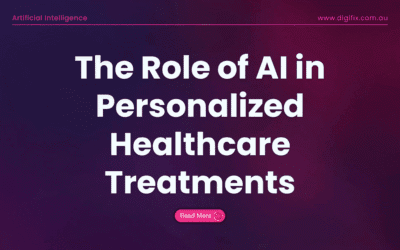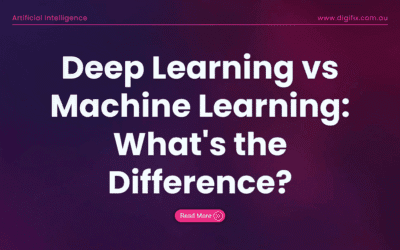Can technology change how we deal with mental health care? As companies in Melbourne and elsewhere use artificial intelligence to innovate, the mental health field is set for a big change.
At DigiFix, a top AI agency, we see how AI in mental health care is making therapy better. With AI, mental health professionals can offer care that’s more tailored and effective.
Looking at where tech meets mental health care, it’s clear AI is more than a tool. It’s a driver of real change. In this piece, we’ll look at how AI is reshaping mental health therapy.
The Current Landscape of Mental Health Care in Australia
The mental health care scene in Australia is complex. It’s facing growing demands for services that are both effective and easy to access. As more people struggle with mental health issues, finding new solutions is more urgent than ever.
Key Challenges in Mental Health Service Delivery:
In Australia, delivering mental health services is tough. There are long waiting times and not enough access to special care. Also, there’s a shortage of mental health experts, especially in rural areas. The stigma around mental illness makes it hard for people to ask for help.
There’s also a need for personalised and effective treatments. The current services don’t meet everyone’s needs. This shows we need new ways to help.

The Growing Demand for Innovative Solutions
The need for more mental health services is driving the search for new solutions. AI technologies are becoming key in this search. They could make services better, help patients more, and make care easier to get.
At DigiFix, we offer AI Automation Services to help mental health providers use these technologies. We provide Custom AI Strategy Sessions & Implementation Plans, AI-Powered Content Creation, and AI Training & Workshops. These help you use AI to its fullest potential.
- Custom AI Strategy Sessions to tailor AI solutions to your needs
- AI-Powered Content Creation for enhanced patient engagement
- AI Training & Workshops to upskill your team
Understanding AI in Mental Health Care
AI in mental health care is about understanding its definition, growth, and key technologies. It shows that ai technology in therapy is real and improving mental health services today.
Defining Artificial Intelligence in Healthcare Contexts
AI in healthcare uses complex algorithms to understand medical data like humans do. In mental health, it uses machine learning and natural language processing. These help in diagnosing and treating mental health issues.
ai technology in therapy helps in many ways. From chatbots to complex systems, it supports mental health professionals. It’s meant to help, not replace them.
The Evolution of AI Applications in Mental Health
AI in mental health has grown fast, with big steps forward in recent years. It started with simple tasks like data analysis. Now, it’s used for personalised therapy and predicting patient needs.
- Early detection of mental health conditions through pattern recognition
- Personalised treatment plans based on individual patient data
- Enhanced patient engagement through interactive tools
For more on AI’s growth, see how conversational AI is changing interactions.
Core Technologies Driving Innovation
Several key technologies are pushing AI in mental health forward. These include:
- Machine Learning: Allows systems to get better with time.
- Natural Language Processing (NLP): Helps machines understand and use human language.
- Computer Vision: Analyzes facial expressions and other visual cues for mental health assessment.
At DigiFix, our Melbourne team uses these technologies for real, measurable results. We offer a 100% FREE initial consultation and ongoing support. This ensures our clients get the best from AI in their mental health care.
Transformative Applications of AI in Mental Health Care
AI is changing mental health care with new ways to spot and treat problems early. It uses tech like machine learning, natural language processing, and computer vision. These tools are making mental health care better.
Machine Learning for Early Detection of Mental Health Conditions
Machine learning looks at lots of data to find signs of mental health issues. This helps catch problems early, which can really help patients. A study in Frontiers in Psychology shows how machine learning can predict mental health problems.
Machine learning has many uses in mental health, like:
- Spotting patients at risk
- Looking at health records for early signs
- Recommending treatments based on patient data
Natural Language Processing for Sentiment Analysis
Natural Language Processing (NLP) helps understand how patients feel by looking at what they say and how they say it. This is great for checking if treatments are working and spotting problems early.
NLP helps in mental health care by:
- Reading patient feedback and reviews
- Spotting signs of depression in speech
- Creating chatbots for first checks
Computer Vision in Behavioural Assessment
Computer vision looks at facial expressions and body language. It gives insights into a patient’s mental state.
Ready to start? Book your free consultation today to see how AI can change your mental health care.
AI-Powered Therapeutic Interventions
AI is changing mental health care, making treatments more personal and effective. It’s helping meet the growing need for mental health services in Australia.
Virtual Therapy Assistants and Chatbots
Virtual therapy assistants and chatbots are now helping people get support anytime. They offer 24/7 support to help manage mental health. For example, chatbots can help with cognitive behavioural exercises and stress management tips.
- Provide immediate support and responses to patient inquiries
- Engage patients in therapeutic exercises and activities
- Offer personalised coping strategies and resources
To learn more about AI in therapy, check out captivating Chat-GPT applications that improve patient care.
Personalised Treatment Recommendations
AI can look at lots of patient data to suggest personalised treatment plans. It uses machine learning to find the best treatment for each patient.
- Analysis of patient history and treatment outcomes
- Identification of patterns and predictors of treatment success
- Generation of personalised treatment plans
Digital Cognitive Behavioural Therapy Tools
Digital CBT tools are a big part of AI in mental health. They offer accessible and flexible therapy options. Patients can get help from home.
- Online CBT programs tailored to individual needs
- Interactive exercises and activities to support therapy
- Progress tracking and feedback mechanisms
DigiFix helps mental health professionals use these tools. They offer custom AI plans to improve patient care and results.
Remote Monitoring and Support Through AI
The use of AI in mental health care is changing how we monitor and support people remotely. It makes care more effective and ongoing.
Continuous Assessment via Smartphone Applications
Smartphone apps are key in checking mental health regularly. They use AI algorithms to watch patient data. This gives real-time views of their mental state.
These apps spot early signs of mental health problems. This means help can come quickly.
The good things about these apps include:
- Spotting mental health issues early
- Getting feedback and support that fits you
- Keeping patients more involved
Predictive Analytics for Crisis Prevention
Predictive analytics is a big part of AI in remote care. It helps stop mental health crises before they start. AI looks at past data and finds patterns. This lets doctors act fast.
Key parts of predictive analytics are:
- Gathering and looking at data
- Figuring out who might have a crisis
- Coming up with plans to help before it’s too late
AI-Enhanced Support Networks
AI is changing how we offer support for mental health. It connects people with the right help and resources. This makes sure they get all the care they need.
DigiFix, for example, uses AI to make content for these networks. This makes support more personal and effective. AI helps these networks give better care and improve patient results.
Data Privacy and Ethical Considerations in Australian Context
The use of AI in mental health services in Australia brings up big questions about data safety and ethics. As we move forward with AI in mental health, we must tackle these issues head-on.
Securing Sensitive Mental Health Information
Keeping patient data safe is a major focus with AI. This means using strong security steps, like:
- End-to-end encryption to protect data as it moves.
- Secure data storage that meets Australian privacy laws.
- Regular security checks to find and fix weak spots.
By focusing on data safety, mental health services can keep patient trust and follow the law.
Ethical Frameworks for AI in Therapeutic Settings
Creating ethical guidelines for AI in mental health is key. These guidelines should cover:
- The need for clear AI decision-making.
- The value of patient consent in AI treatments.
- Setting up accountability for AI results.
AI ethics improve care and encourage responsible innovation.
Australian Regulatory Requirements
Australia has rules for AI in health care, like the Privacy Act 1988 and the Australian Digital Health Agency guidelines. Following these rules is crucial for:
- Safe handling of patient data.
- Staying out of legal trouble and keeping a good reputation.
- Building trust with patients and others in AI mental health.
At DigiFix, we provide AI training and workshops. This helps your team deal with these challenges and use AI well in mental health care.
Implementation Challenges for Mental Health Providers
Using AI in mental health services comes with its own set of challenges. These include technical integration, staff adaptation, and cost. Mental health providers must tackle these to successfully use AI in mental health care.
Technical Integration Hurdles
One big challenge is making AI fit with current systems. This means it must work well with electronic health records (EHRs) and other digital tools. Seamless integration is crucial for smooth service delivery and better patient care.
- Compatibility with existing EHR systems
- Data migration and security concerns
- Integration with other digital health tools
A study in PMC9924259 shows the need for AI to work with healthcare systems. This makes it more effective.
Staff Training and Adaptation
Training staff to use AI tools is another big challenge. Mental health professionals need to learn how to use AI data and insights. They must also know how to mix AI with their own care without losing the human touch.
- Training programs for AI tool usage
- Understanding AI-generated insights
- Balancing AI use with human interaction
Ongoing support is key for staff to feel confident with AI. Regular workshops and training can help a lot.
Cost-Benefit Considerations
Finally, providers must weigh the costs and benefits of AI. AI can lead to better patient care and more efficient operations. But, the initial cost can be high.
DigiFix offers support and optimisation. This helps mental health providers overcome these challenges. It ensures AI solutions meet their changing needs.
How Businesses Can Leverage AI in Mental Health Care
The mental health care sector is changing fast. Businesses are now using artificial intelligence (AI) to improve their services. This helps them stand out from the competition.
The need for better, more personal, and easy-to-access care is driving change. AI is leading this transformation. It offers businesses ways to better serve patients, improve care, and grow.
Strategic Implementation Approaches
To make the most of AI, businesses need a solid plan. This includes:
- Finding where AI can make the biggest difference, like in patient care or treatment plans.
- Checking if the organisation is ready for AI, including data quality and staff skills.
- Creating a detailed plan for AI integration, with timelines and resources.
Selecting the Right AI Tools and Partners
Choosing the right AI tools and partners is key. Businesses should think about:
- What their organisation needs and wants to achieve.
- The strengths and weaknesses of different AI technologies.
- The reputation and skills of potential AI partners.
By carefully looking at these points, businesses can pick AI solutions that fit their needs. This ensures they get real benefits.
Measuring ROI and Patient Outcomes
To show the value of AI and keep improving, businesses must track ROI and patient results. This means:
- Setting clear goals, like better patient care or more efficient operations.
- Using data to monitor and understand performance.
- Improving AI systems based on what data shows.
By using AI wisely and focusing on data, mental health care businesses can gain a lot. They can improve patient care and grow their business.
DigiFix: Pioneering AI Solutions for Mental Health Practitioners
DigiFix is a Melbourne-based expert with global experience. They lead in using AI tools for mental health. They understand Australia’s mental health scene well and are changing how care is given.
DigiFix has a range of new solutions to boost mental health services. They tailor their services to meet the needs of each practitioner. This ensures they can give the best care to their patients.
Custom AI Strategy Sessions for Mental Health Practices
DigiFix knows every mental health practice is different. They offer custom AI strategy sessions to meet these unique needs. These sessions help practitioners use AI well, leading to better patient care and smoother practice operations.
- Personalised AI integration plans
- Enhanced patient engagement strategies
- Optimised practice management through AI
AI-Powered Content Creation for Mental Wellness
Creating engaging content is key for mental health practices. DigiFix’s AI-powered content creation tools help make high-quality materials. These tools ensure content is consistent and effective in engaging patients.
By using AI technology in therapy, DigiFix lets practitioners focus more on patient care. They spend less time on making content.
Specialised Training Workshops for Mental Health Teams
DigiFix offers specialised training workshops for mental health teams. These workshops teach how to use AI tools, interpret data, and follow best practices for patient privacy and security.
- Comprehensive training on AI tools
- Data analysis and interpretation
- Best practices for AI implementation
By working with DigiFix, mental health practitioners in Australia can use the latest AI. This helps them improve their practice and care for patients better.
Case Studies: Successful AI Mental Health Initiatives in Australia
In Australia, many groups are leading the way with AI in mental health care. They’ve seen great results. These efforts range from big public health projects to changes in private clinics. They show how AI can really help with mental wellness.
Large-Scale Implementation in Public Health Systems
In Australia’s public health, AI is making a big difference. Machine learning algorithms are used to look through lots of data. This helps find patterns and guess how patients will do better.
For example, in New South Wales, an AI system predicts when patients will need to be admitted. This helps use resources better.
- Enhanced predictive analytics for patient admissions
- Streamlined resource allocation
- Improved patient care through early intervention
Private Practice Transformations
In private clinics, AI-powered tools are making a big impact. A clinic in Melbourne uses an AI chatbot for first checks and support. This makes things run smoother and lets experts deal with harder cases.
- Initial assessment and support through AI chatbots
- Personalised treatment plans based on AI insights
- Enhanced patient engagement through digital platforms
Measurable Outcomes and Patient Feedback
The success of AI in mental health is clear from the results and what patients say. Studies show AI can really help people. For example, one study found a 40% reduction in symptoms for those using AI therapy.
DigiFix is a leader in using AI for mental health. They focus on AI solutions for mental wellness. This is changing mental health care in Australia.
Conclusion: The Future of AI-Enhanced Mental Health Care
AI is changing mental health care in big ways. It’s bringing new solutions to old problems. Digital mental health AI is making services better, getting patients more involved, and leading to better results.
Technologies like machine learning and natural language processing are getting better fast. This means huge growth for mental health care. Companies like DigiFix are leading the way with AI solutions for both professionals and patients.
In Australia, mental health care is getting a digital boost. Using AI tools and strategies will be key. It will help improve services, make things more efficient, and better care for patients. Find out how AI can change your work. Book a free consultation today to see what’s possible.





0 Comments